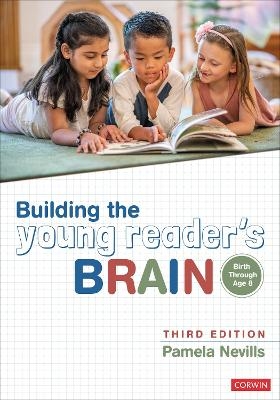
Building the Young Reader′s Brain, Birth Through Age 8
Corwin Press Inc (Verlag)
978-1-0718-8878-0 (ISBN)
In this update of a bestselling classic, you will learn how to develop children’s capacity and will to read. Each sequential chapter is practical, eye-opening, and exactly what you need to engage young learners, plan lessons, partner with parents, and align your PreK-3 classrooms to the science of learning and the science of reading. Gain the latest insights on:
Brain development from birth to age eight, plus the skills to nourish it, age by age and grade by grade
What the latest neuroscientific research now says about oral language acquisition
The evidence base for practices such as read alouds, inventive spelling, and sustained silent reading
Why vocabulary building must happen concurrently with phonological processing, decoding, fluency, spelling, and writing
How to artfully combine explicit teaching of skills with playful, multi-sensory routines every day
All aspects of memory are needed to develop successful readers. When we engage children’s brains and build our teaching practices around what we know about how the human brain makes meaning, literacy learning makes more sense for children… and for us.
Pamela Nevills is first and foremost a teacher of children and adults. Her passion for teaching includes a full range of educator experiences from teaching in the primary grades, to teaching middle and high school, to being a teacher supervisor and instructor in university undergraduate, graduate, and doctoral programs. She participates in local, state, and national educational committees in the area of special education. As a two-time member of the instructional textbook selection committee for reading in the state of California, she brings expert knowledge of how children learn to read, and the materials teachers can use to follow the science of reading. Her passion for the cognitive and neurological aspects of reading stems from interactions with Dr. Pat Wolfe. Nevills is a national and international speaker and consultant on topics that include reading standards according to the Common Core; brain development from infancy to adulthood; all aspects of cognitive, neurological involvement for reading; and school management and design for teaching reading. Writing became a part of Nevills’s work as she published for newsletters, the state of California, the Journal of Staff Development, and Corwin. Her involvement also includes research and studies for church organizations and an advisory board position for preschool. To contact Pamela Nevills, please email panevills@earthlink.net..
Preface
Acknowledgments
About the Author
Chapter 1: Learning From Birth to 2 Years
Chapter 2: Rapid Learning for 2- and 3-Year-Olds
Chapter 3: Preparing for This World at Age 4
Chapter 4: School Routines and Rapid Learning for 4- and 5-Year-Olds
Chapter 5: Preparing for Reading at Ages 4–6
Chapter 6: Teaching for Reading in First Grade
Chapter 7: Second-Grade Readers
Chapter 8: Transition Time for Third-Grade Readers
Chapter 9: Assessing and Responding to Readers With Disabilities
Chapter 10: Teachers and Students as Learning Partners
Chapter 11: Conclusion: A Dozen Key Learnings
Appendix A: Continuum of Developmental Benchmarks: Birth to Age 5
Appendix B: Cognitive Skills for Learning
Appendix C: Quick Reference Guide for Memory Systems
Glossary
References and Resources
| Erscheinungsdatum | 29.07.2023 |
|---|---|
| Verlagsort | Thousand Oaks |
| Sprache | englisch |
| Maße | 177 x 254 mm |
| Gewicht | 650 g |
| Themenwelt | Schulbuch / Wörterbuch ► Wörterbuch / Fremdsprachen |
| Geisteswissenschaften ► Sprach- / Literaturwissenschaft ► Sprachwissenschaft | |
| Sozialwissenschaften ► Pädagogik ► Vorschulpädagogik | |
| ISBN-10 | 1-0718-8878-1 / 1071888781 |
| ISBN-13 | 978-1-0718-8878-0 / 9781071888780 |
| Zustand | Neuware |
| Informationen gemäß Produktsicherheitsverordnung (GPSR) | |
| Haben Sie eine Frage zum Produkt? |
aus dem Bereich


